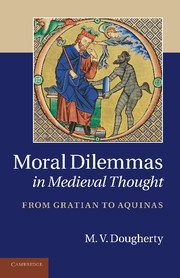Book contents
- Frontmatter
- Contents
- Preface
- Introduction
- 1 Gratian and his glossators on conflicts in the natural law
- 2 Twenty moral dilemmas from two early thirteenth-century summaries of theology: William of Auxerre's Summa aurea and the Franciscan Summa Halesiana
- 3 Raymond Lull and moral ensnarement in the Vita coaetanea
- 4 Thomas Aquinas, moral dilemmas, and a missing article from Quodlibet XII
- 5 Thomas Aquinas on failures of practical reasoning: Why synderesis doesn't inoculate agents against malformed conscience dilemmas
- 6 Moral dilemmas in the early Thomistic tradition: Johannes Capreolus and the Deceiving Demon Dilemma
- Conclusion
- Bibliography
- Index
Introduction
Published online by Cambridge University Press: 03 May 2011
- Frontmatter
- Contents
- Preface
- Introduction
- 1 Gratian and his glossators on conflicts in the natural law
- 2 Twenty moral dilemmas from two early thirteenth-century summaries of theology: William of Auxerre's Summa aurea and the Franciscan Summa Halesiana
- 3 Raymond Lull and moral ensnarement in the Vita coaetanea
- 4 Thomas Aquinas, moral dilemmas, and a missing article from Quodlibet XII
- 5 Thomas Aquinas on failures of practical reasoning: Why synderesis doesn't inoculate agents against malformed conscience dilemmas
- 6 Moral dilemmas in the early Thomistic tradition: Johannes Capreolus and the Deceiving Demon Dilemma
- Conclusion
- Bibliography
- Index
Summary
Is moral wrongdoing ever genuinely unavoidable? That is, will anyone ever experience real conflicting obligations at a given moment and thereby be compelled to act wrongly? This study considers several medieval theorists who dealt with the question of whether moral dilemmas are part of the moral life. As it is often assumed that serious theorizing about moral dilemmas was first achieved in modern philosophy, only to be refined further by contemporary thinkers, this book analyzes a rather neglected part of the history of Western ethical thought. The common view assumes that during the medieval period all moral theorists adhered to the maxim “ought implies can.” In contrast to that view, this book identifies medieval adherents to “ought but cannot.” Several medieval thinkers not only wrestled with the problem of reconciling the experience of moral conflict with the widespread assumption that no one should ever be forced to do wrong, but they also propounded their solutions with a level of sophistication that may be surprising to present-day philosophers. In light of these overlooked medieval contributions, the history of moral dilemma theory must be re-written. This book discloses that much of what seems particular to twentieth-century moral theorizing was quite well known long ago.
The present volume offers a sampling of these medieval debates, with particular attention to the diversity of examples of moral dilemmas central to those discussions. Many of them are surprisingly vivid, extraordinary, and at times quite shocking.
- Type
- Chapter
- Information
- Moral Dilemmas in Medieval ThoughtFrom Gratian to Aquinas, pp. 1 - 12Publisher: Cambridge University PressPrint publication year: 2011



